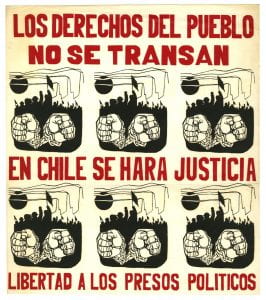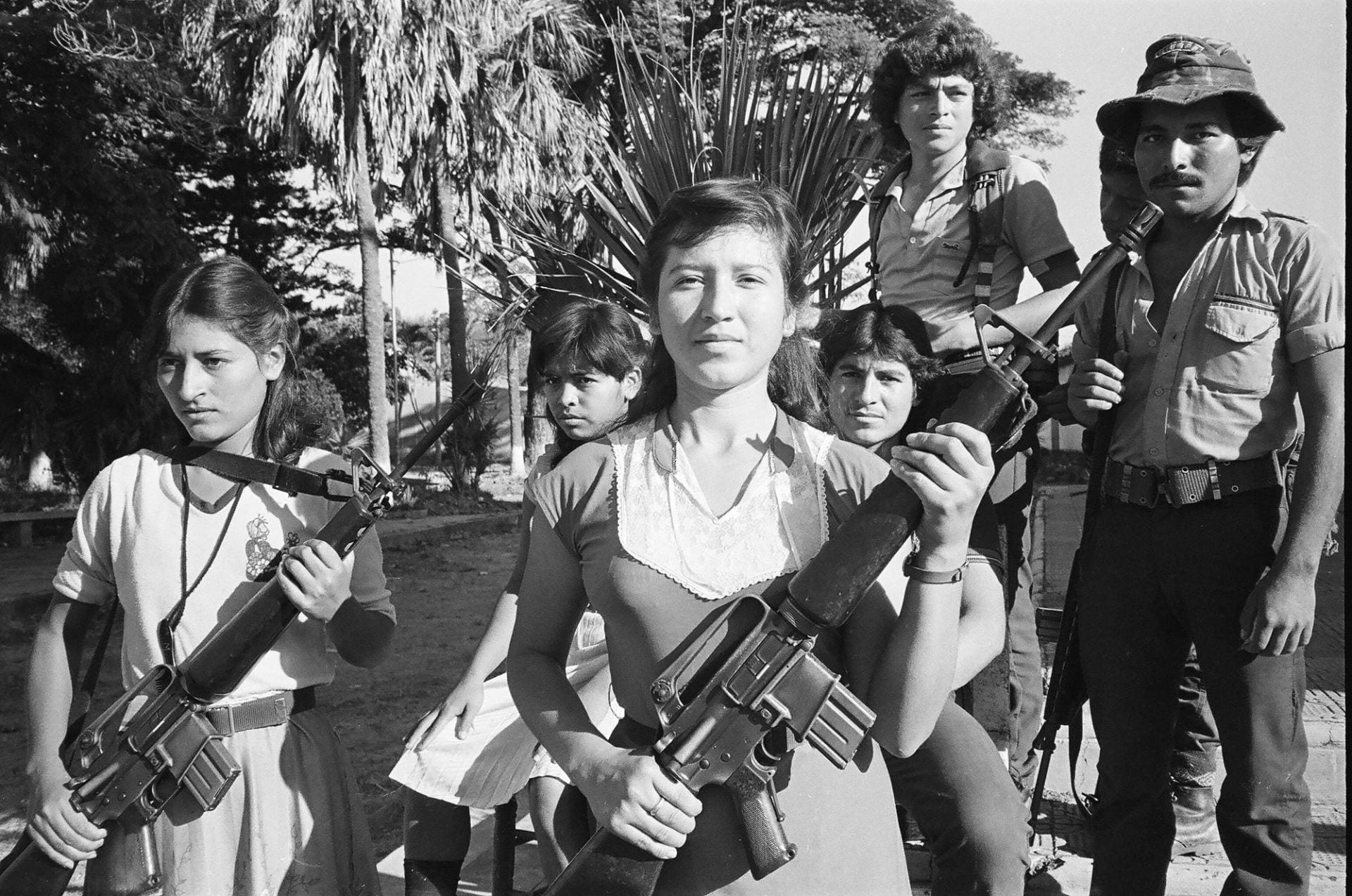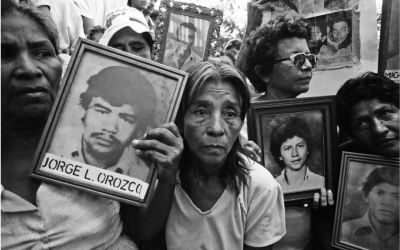Notes from Exile
Horizons of Democracy

The poster demands freedom for political prisoners. Poster art courtesy of Museo De La Memoria Y Los Derechos Humanos, Chile
It certainly sounded glamorous at the time—and even might sound so today. In October 1981, I flew from Berkeley, California, where I had been visiting, to attend an academic conference at Yale University on political scenarios under the Chilean dictatorship. I had an airline ticket in my pocket to take me, after the conference, to Lund, Sweden. So far so good, except that the student visa I had received upon entering the United States in 1976 had just expired.
At that point I was considering Sweden as a potential place of residence after receiving an invitation to present a paper there on Chilean Marxist philosophy, a topic I had analyzed in my dissertation. The Swedish conference was a gathering of mainly Latin American exiles seeking to address the increasingly agonizing question whether Marxism was still relevant in the early 1980s, when workers in Poland, just across the Baltic Sea, were rebelling against their Marxist masters. I was on my way to lots of questions and uncertainties about the future.
My host at Yale had been Daniel C. Levy, a specialist in Latin American higher education, who’d told me that there would be several Chileans at the U.S. conference. I was starved for Chilean company, so I was grateful for the opportunity to attend and catch up with compatriots. I had given up on ever returning to Chile. In 1974 I had barely escaped arrest and fled to Argentina, where I managed to stay for a year working as a machinist, and where the political situation soon deteriorated. I returned to Chile briefly, but was again forced to leave the country, this time in defiance of the draft. I thought I could claim an amnesty a few years later, and in fact went back to Chile to claim it, but instead I was tried and sentenced for violations of military law. A return to the country under the circumstances would have been foolhardy, and surely a route to further trouble. Sweden, where I had friends and an academic purpose, sounded like the best prospect at the time.
This is what was in my mind when I listened to the presentations on Chile at Yale, analyzing the impact of eight years of dictatorship. I felt somewhat detached, experiencing what I now recognize as symptoms of denial. My horizon was no longer Chile, but rather any place where I might be able to live. Among the Chileans at that meeting was Sol Serrano, a historian like myself. We had a brief conversation about issues that were rather incongruous in that particular setting: the decade of the 1840s, when a sort of cultural and political renaissance had occurred after a long authoritarian experience. Sol had been a journalist in one of the opposition journals, and was now at Yale pursuing an M.A. in history. It was a short conversation, but it lingered in my mind when I arrived in Sweden. It became clear to me that for Sol the future of the country was still an open-ended question, and that she clearly understood that intellectuals, both inside and outside of the country, could play a role in it. She saved me from cutting off all ties to Chile, though I did not know it at the time, when I was still searching for a place to live.
Giving up on Sweden for the time being, I returned to the United States thanks to an invitation from historian Tulio Halperín Donghi, which allowed me to settle in Berkeley briefly in 1982, and for a longer time beginning in 1983. My job as a researcher and then as program coordinator in the Center for Latin American Studies at UC-Berkeley was to put together activities relating to hemispheric issues. At the time, Central America, with the Nicaraguan revolution and the Contra War, was at the center of public attention. But so was Argentina, with the fall of the military government and the rise of Raúl Alfonsín, who became president of the country and was later honored at Berkeley for his role in leading the country back to democracy.
I had meanwhile become involved in human rights issues through the Latin American Studies Association (LASA), writing a report on the Mapuche of southern Chile, whose lands had been privatized under Pinochet, disrupting and rupturing their communities. And under the guidance of Lars Schoultz, who was then the head of the Task Force on Human Rights and Academic Freedom, I was also able to submit and pass a resolution condemning the assassination of three human rights workers in Santiago in March 1985. I thus found a way to break out of my selfish denial and collaborate with colleagues committed to alleviating in some fashion, or at least, denouncing egregious violations of human rights.
Chile was also present in some of the lectures I helped organize, and very much so when the time of the plebiscite approached in 1988. It was in that context that I contacted Paul W. Drake, who generously accepted a proposal to collaborate, institutionally and personally, on a project that brought leading scholars of Chile to analyze the prospects for a transition to democracy. Such a transition had been contemplated in the 1980 Constitution, but there were doubts about the sincerity of the government in implementing it. The response from Chilean academics was extraordinary, partly because the space for public discussion had become very limited in Chile after the failed assassination attempt against Augusto Pinochet in 1986. Although we organizers of the event strongly believed that Chileans would orchestrate their own transition to democracy, it was in academic venues like this where issues were laid out and subsequent policies developed. Many of the participants in our conference, which took place in San Diego, and many of the authors in our The Struggle for Democracy in Chile, became leading figures in the Concertación government that reinstated democracy in 1990.
What became very clear to me, both in my own work and in the coordination of academic conferences and workshops, was that the times required a revision of the standard understanding of how our nations became nations, and how political systems evolved into what they had become at the time: in most cases a sad trajectory from formal democracy to authoritarian rule. It became important to me to return to the roots of our history in order to look more deeply into institutional designs, historically bound political decisions, and fundamental values that had been lost along the way, although I certainly did not idealize the 19th century. The excessively long experience of dictatorship made me, and I dare say my generation, appreciate what had been taken for granted in previous decades. Democracy was now certainly more than a set of procedures for electing representative governments; indeed it was a political philosophy that involved a commitment to fundamental values such as human rights.
And yet, the achievement of democracy in Chile in 1990 was not the triumphant end to an odd chapter in our history. For those of us who remained abroad, distance allowed us to be perhaps less celebratory, and certainly more critical than Chileans at home. Because of the peculiar nature of the transition, with a tight civil-military coalition that had been only partly defeated, the work of democratization was not done. Although there might have been some timidity on the part of the government to push for a more stern policy on human rights, or for further democratization, governing with Pinochet at the helm of the army was not an easy matter. That is why it was still important to observe developments and promote an understanding of the gains and limitations of the transition era. This meant organizing new panels at LASA and other venues, and embarking on a new project with Paul Drake, supported by the Ford Foundation, analyzing the first decade of democratically elected governments. What was eventually published under the title El modelo chileno: democracia y desarrollo en los noventa (1999) was an attempt to critically assess what had been accomplished and what remained as blind spots in the search for deeper democratization.
One of the central issues was inequality. We pointed to the successes of the Concertación, especially in terms of reducing poverty, but also to the shortcomings, as Chile was increasingly becoming one of the worst examples of income disparities in the region and beyond. Another issue was human rights. This was dramatically corroborated when we met in San Diego with several scholars and human rights advocates in October 1998. Just a couple of days into our discussions the news arrived that Augusto Pinochet had been arrested in London. The late Patricia Verdugo and others present at the gathering had lost family members or loved ones during the fierce repression of the Pinochet regime. The outcome of the arrest attested to the persistence of memory, and to the sense of justice that inspired the fight for democracy. Clearly, it had not been enough to return to democratic elections in 1989. Democracy required justice, and justice could only be served if people like our guests retained the memories of repression, and persevered in their quest for redress despite the efforts of the first Concertación governments to settle the issue. The arrest of Pinochet changed everything. Memory would live on and kept pushing the boundaries of the politically prudent.
Extremely significant for me personally was the case of Felipe Agüero, a friend and colleague of many years, who came out publicly to reveal the identity of his torturer at the Estadio Nacional in 1973. The case resonated strongly in Chile, and also in the United States, where it was covered extensively by The Chronicle of Higher Education and by The New York Times. I expressed my opinion in both venues that the case spoke directly to the unresolved questions in Chile’s transition to democracy. But before the issue could gain much traction in the United States, just a few months later, 9/11 happened, understandably moving the public preoccupations and the international policy agenda in a different direction. But something important did take place. Felipe had been there alone with his memory to confront many years of silence and denial. Now he could summon the support of people who, albeit slowly at first, agreed that his testimony was far more valid than anything that his tormentors could muster. He won the specifics of the case, but in the process he also revealed that there was much work, and there still is, to be done to get to the bottom of the injustices committed during the dictatorship. Full democratization will not happen until such situations are openly addressed and the appropriate mechanisms are fully developed to prevent them.
I am back in Chile now, since 2006, after nearly four decades since I first left the country. The issues mobilizing people are different these days, but the forty years that have passed since the military coup of September 11, 1973, serve as a reminder that memory, painful though it might be, allows people like me to retain and process the personal and emotional immediacy that is necessary to move on, both individually and collectively. Memory also increases our chances of building the democratic procedures that will prevent the recurrence of another breakdown of civilian rule with all its consequences. We will be the stronger for it.
Related Articles
A Search for Justice
In 2004, when I left Harvard and last saw you, I thought I would never learn the truth of what exactly happened to Carlos Horacio in the horrendous holocaust of the Palace of Justice in Bogotá. Yet fate was holding a tremendous surprise for my daughters and me, filled with…
Memory: Editor’s Letter
Editor's Letter Memory Irma Flaquer’s image as a 22-year-old Guatemalan reporter stares from the pages of a 1960 Time magazine, her eyes blackened by a government mob that didn’t like her feisty stance. She never gave up, fighting with her pen against the long...
A Search for Justice in El Salvador: One Legacy of Ignacio Martín-Baró
In the small rural town of Arcatao, Chalatenango, Rosa Rivera clung to the hope that one day she would find the remains of her disappeared mother and father and lay them to rest in peace. Others sought to exhume mass graves hoping to recover bodies of nearly 1,000 relatives massacred in the Río Sumpul. …




